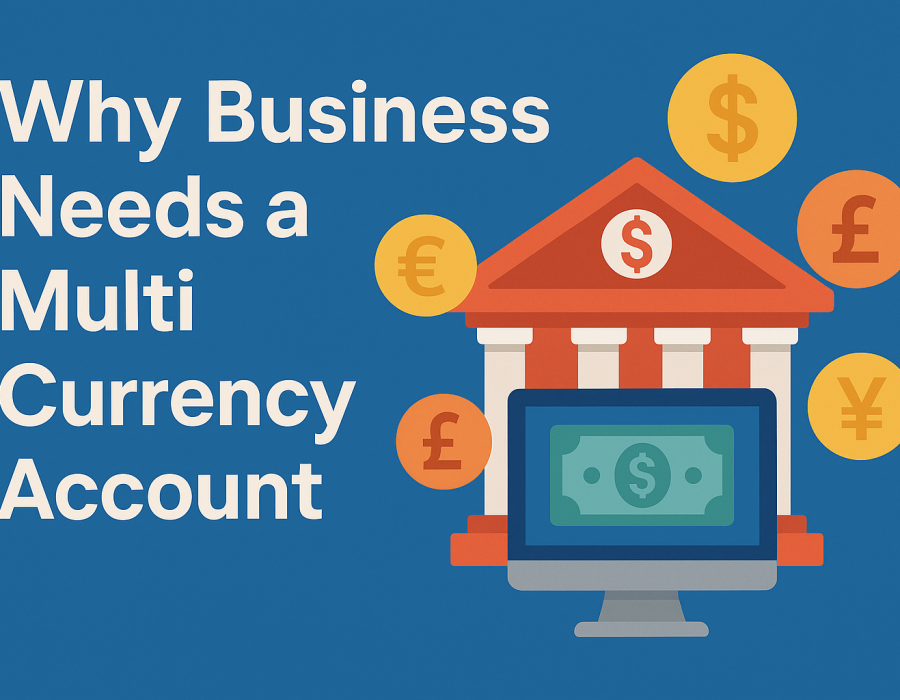1. The Modern Global Marketplace: Why One Currency Just Isn’t Enough
Let’s face it the business world has gone global. Whether you're a small e-commerce store in Pakistan shipping to Dubai, or a mid-sized software company in the UK servicing clients in the U.S., international customers are no longer “optional” they’re the norm.
But here’s the kicker: dealing with multiple currencies using a single-currency bank account is like trying to play soccer in ski boots it works, but badly.
A multi currency account solves this problem by allowing businesses to receive, hold, and send money in multiple currencies without converting every transaction. No more hidden fees. No more exchange rate shocks. Just smooth, borderless banking.
Let’s break this down.
1.1 Cost Savings on Currency Conversion
Traditional bank accounts convert every foreign payment into your base currency and guess what? They use their exchange rate, not the real market rate. That can mean losing 2–5% per transaction just on fees.
With a Multi Currency Account, you can hold funds in the original currency, wait for a favorable exchange rate, or pay vendors in the same currency all of which saves serious money.
1.2 Avoid Hidden International Fees
Ever noticed that mysterious “international handling fee” on your statement? Multi currency accounts often skip SWIFT fees and reduce cross-border charges by routing payments locally.
This alone can boost profit margins, especially if you're doing high-volume sales abroad.
1.3 Faster Transactions = Happier Customers & Vendors
No one likes waiting days for a wire transfer to clear. Multi currency accounts often come with local bank details in different countries (like a UK IBAN, US routing number, EU SEPA code, etc.). That means faster delivery of funds and less time spent answering “Where’s my payment?” emails.
2. Business Growth, Flexibility & Financial Control
Once you’ve gone global, staying global requires agility. Multi currency accounts aren’t just about receiving payments they unlock growth.
2.1 Expand Into New Markets Seamlessly
Launching in a new region? Instead of opening a local bank account (which can be a nightmare), a multi currency account lets you create local collection accounts virtually. That means your French customer pays a Paris-based IBAN and your Chinese supplier gets paid in Yuan with no red tape.
2.2 Better Financial Visibility & Budgeting
Managing multiple currencies in a single dashboard gives you a clearer view of your cash flow, so you can budget more precisely, manage exchange rate risks, and even track profits by region or currency.
Need to compare how much you earned in USD vs EUR this quarter? Easy.
2.3 Strategic Currency Holding
With a multi currency account, you can hold onto a strong currency if the exchange rate isn’t in your favor and convert when it makes sense. That means more power, more flexibility, and better margins.
It’s not just smart it’s strategic.
3. The Competitive Edge: Why Smart Businesses Switch to Multi Currency Accounts
We’re in a digital-first world where speed, transparency, and cost-efficiency aren’t luxuries they’re expectations.
3.1 Freelancers, Startups, and SMEs Win Big
Whether you're a solo web designer billing clients in AUD, a Shopify store selling across Europe, or a small agency working with US-based partners, multi currency accounts are a game-changer. You no longer need to rely on clunky, expensive international banking.
Services like Wise, Payoneer, and Revolut Business have democratized access to this once corporate-only feature. Now everyone can go global.
3.2 Build Customer Trust
Offering clients the ability to pay in their own currency builds confidence. It feels local, professional, and frictionless and that builds brand loyalty.
3.3 Simplify Tax and Accounting
No more scrambling through spreadsheets trying to decode messy exchange rate conversions. Multi currency accounts streamline tax reporting, make reconciling books easier, and keep your accountant from pulling their hair out.
3.4 Protect Against Currency Volatility
Economic conditions shift fast. A multi currency account lets you diversify your currency exposure, which can act like a hedge against inflation or economic dips in one region.
Think of it like having multiple income streams only in different currencies.
Conclusion
To sum it up: if your business is dealing with international clients, suppliers, or employees, sticking to a single currency account is like doing e-commerce with dial-up internet outdated, limiting, and expensive.
A multi currency account gives you speed, flexibility, cost-savings, and most importantly, control. Whether you're a growing startup or an established enterprise, it’s one of the smartest moves you can make to scale globally without the banking headache.
So, what are you waiting for?





Comments